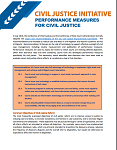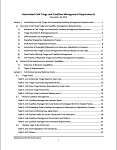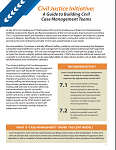How to Get Started:
1) Roadmap
Courts will begin the process of reforming their civil justice systems at different points, addressing different needs, and with different preexisting knowledge and experience. Transforming our Civil Justice System for the 21st Century: A Roadmap for Implementation outlines preliminary steps that courts can take to implement the CJI recommendations in a way that is thoughtful, responsive to the needs of court users, well-designed, and well-executed so that the reforms have the greatest likelihood of success.
2) Questionnaire
Assessing Areas of Impact in Civil Justice Reform: A Questionnaire for State Courts provides a structured self-assessment tool to help court leaders highlight areas within their civil justice system in need of reform as well as potential implementation barriers.
3) DIY Assessment Guide
 Learn how to do your own civil landscape with this tool: Assessing the Landscape of Civil Litigation: A Do-It-Yourself Guide for State Courts.
Learn how to do your own civil landscape with this tool: Assessing the Landscape of Civil Litigation: A Do-It-Yourself Guide for State Courts.
4) Performance Measures
The CJI Performance Measures document provides a description of common metrics and methods for assessing the effectiveness of existing and newly implemented civil justice rules and business practices.
The Road to Civil Justice Reform
 The Road to Civil Justice Reform, provides a compilation of case studies from four states—Idaho, Maine, Missouri, and Texas—that used the roadmap to help implement the CCJ recommendations, with the assistance of IAALS and the NCSC. It shares lessons learned from each state's experiences implementing reform on the ground. The four roadmap states illustrate that different courts, with different paths, can be very successful, providing other states with tangible experiences on which to draw when initiating their own efforts.
The Road to Civil Justice Reform, provides a compilation of case studies from four states—Idaho, Maine, Missouri, and Texas—that used the roadmap to help implement the CCJ recommendations, with the assistance of IAALS and the NCSC. It shares lessons learned from each state's experiences implementing reform on the ground. The four roadmap states illustrate that different courts, with different paths, can be very successful, providing other states with tangible experiences on which to draw when initiating their own efforts.
Preventing Whack-a-Mole Management of Consumer Debt Cases: A Proposal for a Coherent and Comprehensive Approach for State Courts
 This white paper on consumer debt collection was developed in response to requests for the CJI Implementation Plan to provide guidance to state court policymakers on managing different types of debt collection cases, given the growing caseload and recognition of existing gaps in effective case management in our courts.
This white paper on consumer debt collection was developed in response to requests for the CJI Implementation Plan to provide guidance to state court policymakers on managing different types of debt collection cases, given the growing caseload and recognition of existing gaps in effective case management in our courts.
Case Management VizTool
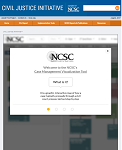 Interested in visualizing team-based case management concepts, the potential for automation in case management, and associated business rules and processes? The Case Management Visualization Tool (VizTool) captures these concepts in an interactive process map and also allows users to create and tailor maps unique to their own jurisdiction.
Interested in visualizing team-based case management concepts, the potential for automation in case management, and associated business rules and processes? The Case Management Visualization Tool (VizTool) captures these concepts in an interactive process map and also allows users to create and tailor maps unique to their own jurisdiction.
Automated Civil Triage
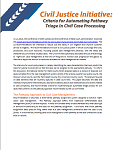 The Criteria For Automating Pathway Triage in Civil Case Processing explores the feasibility of using data elements that are routinely in court case management systems to triage cases into the most appropriate pathway for civil case processing based on actual case complexity as measured by the degree of judicial involvement in case resolution. Using information collected from case pleadings (complaint and answer), the algorithms included in the final triage model assigned civil cases to the correct pathway in 93% of cases filed in limited jurisdiction courts/divisions and 74% of cases filed in general jurisdiction courts/divisions. The white paper concludes with geographical and structural considerations for automated civil case triage and implementation recommendations.
The Criteria For Automating Pathway Triage in Civil Case Processing explores the feasibility of using data elements that are routinely in court case management systems to triage cases into the most appropriate pathway for civil case processing based on actual case complexity as measured by the degree of judicial involvement in case resolution. Using information collected from case pleadings (complaint and answer), the algorithms included in the final triage model assigned civil cases to the correct pathway in 93% of cases filed in limited jurisdiction courts/divisions and 74% of cases filed in general jurisdiction courts/divisions. The white paper concludes with geographical and structural considerations for automated civil case triage and implementation recommendations.
Automated Civil Case Triage and Caseflow Management Requirements
These Case Management System (CMS) Requirements incorporate triage and pathway caseflow concepts.
Ensuring the Right to be Heard: Guidance for Trial Judges in Cases Involving Self-Represented Litigants
To help trial judges better manage cases involving self-represented litigants, with the ultimate goal of service to court users, this paper summarizes what research and experience show to be effective practices for resolving cases with one or more self-represented litigants in the courtroom. It summarizes the challenges facing self-represented litigants, followed by the challenges facing trial judges in adjudicating these cases. It reviews ethical standards governing a judge’s handling of these cases, and then concludes the an outline of practices that have proven most effective.
A Guide to Building Civil Case Management Teams
The CCMT Guide describes how administrative and skilled court staff can be trained and empowered to undertake case management responsibilities, freeing judicial officers to focus on tasks that require their unique judicial expertise.
Guidelines for Creating Effective Self-help Information
To be used effectively by self-represented litigants, self-help materials must acknowledge and address the barriers to deployment. The guidelines discussed in this paper are intended to help courts increase the efficacy of existing self-help materials and assist in the development of new materials that empower parties with information, and an understanding of what to do with that information.
On July 27, 2016, the Conference of Chief Justices (CCJ) and the Conference of State Court Administrators (COSCA) approved a Resolution endorsing the Recommendations of the CCJ Civil Justice Improvements (CJI) Committee and encouraging their members to consider the Recommendations to improve the delivery of civil justice in their own states. Under the direction of the CJI Steering Committee, the NCSC and IAALS developed an Implementation Plan to provide education, technical assistance, and practical tools to help state and local courts implement the Recommendations. To request information about the Recommendations or additional resources on civil justice reform efforts use the Contact Us form. To request a CJI expert for an education program or to request technical assistance, please complete and email the Request Technical Assistance Form to Paula Hannaford-Agor at phannaford@ncsc.org.
The tools above provide a variety of assistance to jurisdictions interested in civil justice reform.



